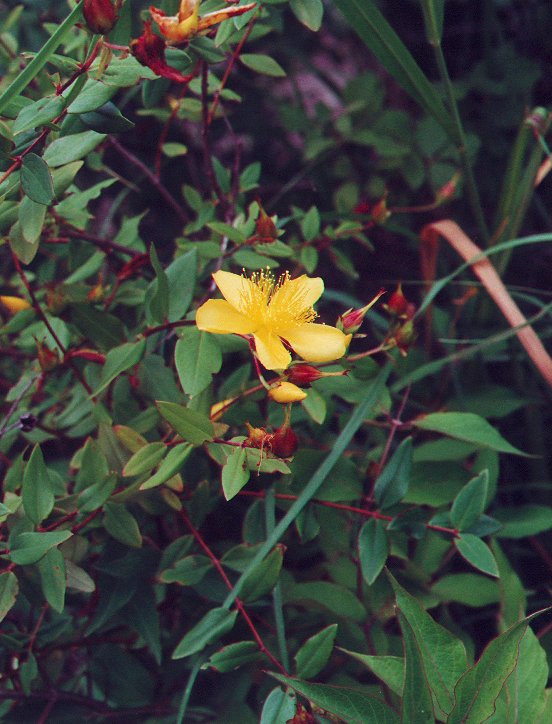Hypericum ascyron ssp. pyramidatum (Aiton) N. Robson
Great St. John's-Wort

Native
CC = 10
CW = 0
MOC = 7
SRank = S1
© DETenaglia
Hypericum ascyron ssp. pyramidatum (Aiton) N. RobsonGreat St. John's-Wort | |
 |
Native CC = 10 CW = 0 MOC = 7 SRank = S1 |
© DETenaglia |
|
Family - Hypericaceae Stems - Suffrutescent, erect to reclining, multiple from base, branching, reddish, glabrous, shrubby, to +/-1m tall. Bark of lower stems often shredding. Leaves - Opposite, decussate, sessile to very short-petiolate, ovate to lance-ovate, acute, entire, shiny green above, grayish-green below, to +5cm long, +/-2.5cm broad, glabrous, thick. Inflorescence - Typicallt single axillary flowers near apex of stems, sometimes cymose. Pedicels to 1.3cm long, glabrous. Flowers - Petals 5, yellow, distinct, shiny above, obovate, to 3.5cm long, +2cm broad, glabrous. Stamens many (+100), erect. Filaments yellow, glabrous, to 1.8cm long. Anthers yellow, 1.2mm broad. Ovary superior, yellow, 5-locular, 1cm long, +/-6mm in diameter, glabrous. Placentation axile, ovules (seeds) many. Styles 5, united near base. Sepals 5, spreading, lance-ovate, 1cm long, 5-6mm broad, glabrous. Margins reddish, strigillose. Capsule ovoid, to 3cm long, -1cm in diameter, glabrous, often reddish, dehiscing by 5 valves.
Flowering - June - September. Habitat - Rich wooded slopes, open woods, thickets, also cultivated. Origin - Native to the U.S. Other info. - This species has the largest flowers of any other Hypericum in Missouri. The flowers are quite showy and thus the plant is gaining popularity in cultivation. It is easy to grow and requires no care once established. This species is rare in the wilds of Missouri, only being collected in a few northern counties. It is, however, commonly found in cultivation. Photographs taken at the Kansas City Zoo, 6-29-00. |